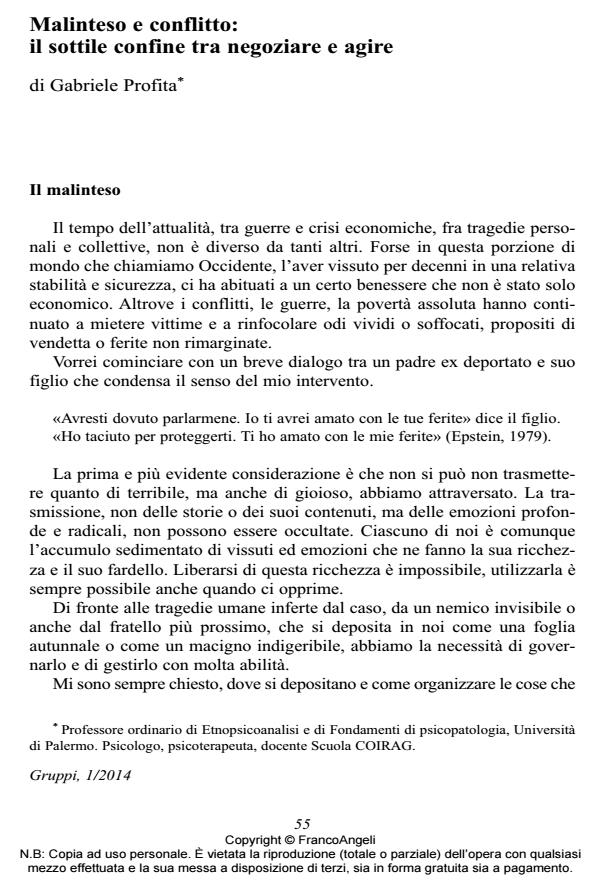Misunderstanding and conflict: the subtle boundary between negotiating and acting
Journal title GRUPPI
Author/s Gabriele Profita
Publishing Year 2014 Issue 2014/1
Language Italian Pages 13 P. 55-67 File size 92 KB
DOI 10.3280/GRU2014-001006
DOI is like a bar code for intellectual property: to have more infomation
click here
Below, you can see the article first page
If you want to buy this article in PDF format, you can do it, following the instructions to buy download credits

FrancoAngeli is member of Publishers International Linking Association, Inc (PILA), a not-for-profit association which run the CrossRef service enabling links to and from online scholarly content.
"Misunderstanding" originates from the communicative difficulties that arise between two people or groups due to linguistic or cultural issues, and stems from the difficulties produced by the difference between the subjects involved in a relationship. A peculiarity of misunderstanding is the anticipation of a possible resolution. This allows us to keep the relationship in a suspended state, preserving its progression while waiting for clarification or separation. By contrast, in a conflictual situation, both partners are engaged in a long-lasting relationship, which transforms the contenders’ nature itself. Indeed, both the parties involved in a conflict shape themselves in a reciprocal relationship, sometimes as strong and resolute as it is unbearable. Such a situation is well illustrated by the so-called "feuds". This paper analyzes misunderstanding as a way to negotiate shared meanings while keeping our own vision and freedom. The two parties involved in a conflict find themselves in a relationship of mutual dependence that is hard to solve without a third party’s mediation or authoritative decision. A section of this paper expounds the subject of "acknowledgement", seen as a possible key to resolving a conflict and also to reducing both the extent and the probability of further misunderstandings.
Keywords: Misunderstanding, conflict, culture, illness, groups, identity
- Agamben G. (2006). Che cos’è un dispositivo? Roma: Nottetempo.
- Agamben G. (2011). Altissima povertà. Regole monastiche e forme di vita. Vicenza: Neri Pozza.
- Benasayag M., del Rey A. (2007). Eloge du conflit. Paris: La Découverte.
- De Martino E. (1977). La fine del mondo: contributo all’analisi delle apocalissi culturali. Torino: Einaudi.
- Devereux G. (2012). De l’angoisse à la méthode dans les sciences du comportement. Paris: Flammarion.
- Epstein H. (1979). Le traumatisme en héritage. Paris: La Cause des livres, 2005.
- Ferrarese E. (2013) (sous la direction de), Qu’est-ce que lutter pour la reconnaissance? Lormont: Le Bord de l’eau.
- Honneth A. (2000). La lutte pour la reconnaissance. Paris: Ed. du Cerf.
- Honneth A. (2006). La société du mépris. Vers une nouvelle théorie critique. Paris: La Découverte.
- Honneth A. (2007). Reificazione: uno studio in chiave di teoria del riconoscimento. Roma: Meltemi.
- Jankélévitch V. (1980). Il non-so-che e il quasi-niente. Torino: Einaudi, 2011.
- Kaës R. (1992). Patto denegativo e alleanze inconsce. Elementi di metapsicologia intersoggettiva. Interazioni, 1: 22-33, 1994.
- Recalcati M. (2010). L’uomo senza inconscio. Figure della nuova clinica psicoanalitica. Milano: Raffaello Cortina.
- Sartre J.P. (1943). L’essere e il nulla. Milano: Il Saggiatore, 1965.
- Scott J.C. (2006). Il dominio e l’arte della resistenza: i “verbali segreti” dietro la storia ufficiale. Milano: Elèuthera.
- Legami familiari e violenza, il lavoro del gruppo nella pensabilità Anna Iannotta, in GRUPPI 2/2020 pp.175
DOI: 10.3280/GRU2019-002017
Gabriele Profita, Malinteso e conflitto: il sottile confine tra negoziare e agire in "GRUPPI" 1/2014, pp 55-67, DOI: 10.3280/GRU2014-001006